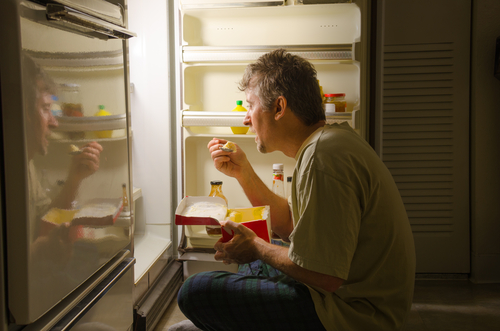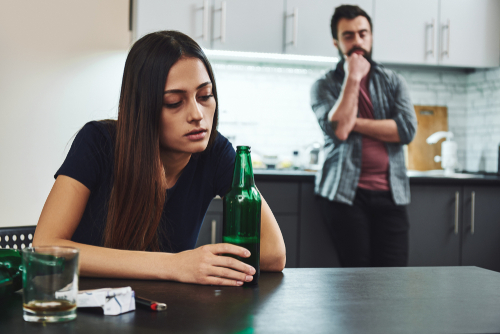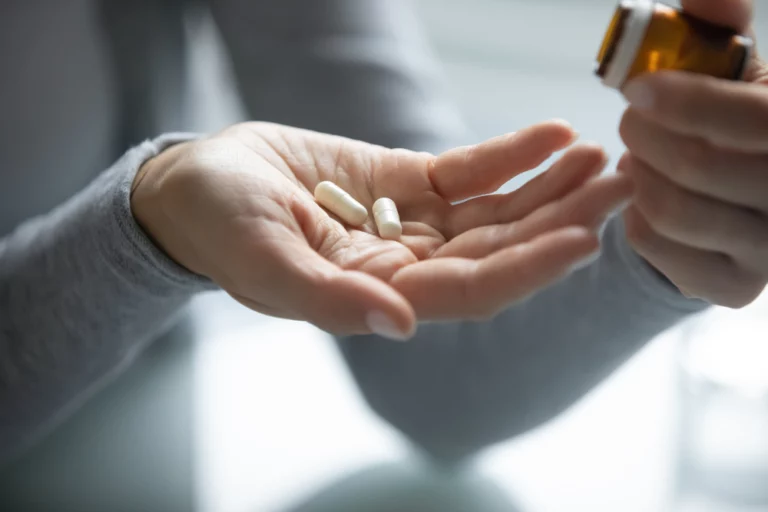If you want to know if you’re self-medicating to deal with stress, this is the article for you. It can be tempting to numb negative feelings and avoid stressful situations using drugs and alcohol. Self-medicating can also manifest itself through eating disorders and nicotine addictions. Once you finish this article, you’ll know why self-medicating to deal with stress is a bad idea, signs you might be self-medicating, and more.
Self-medicating with drugs, alcohol, food, or nicotine to deal with stress can lead to addiction, organ damage, financial issues, and social challenges.
What Is Self-Medicating?
Self-medicating is when an individual uses substances or food to cope with anxiety, depression, or symptoms of a mental health disorder. You might be aware of your mental health disorder or be undiagnosed and view your substance use solely as an addiction without recognizing that it could be your brain’s cry for help.
Studies have found that among individuals who had a mood disorder and used drugs within the past year, 38.1% admitted to self-medicating with drugs. In times of significant anxiety and distress, individuals can use substances to alter their emotional state. Some individuals may use food to uplift their mood, alleviate boredom, or satisfy compulsions.
Others may smoke a joint to relax or have a drink to calm their nerves and mitigate social anxiety before going out. Alternatively, some individuals may rely on medications like Xanax or Valium to aid sleep, ADHD medications to enhance daytime focus, or prescription painkillers to numb feelings of grief or stress.

Why Do People Self-Medicate To Deal With Stress?
There a various reasons why people self-medicate. We’ve identified three main reasons individuals resort to substance abuse to cope with mental health issues.
- No access to healthcare: People often turn to self-medication due to a lack of proper healthcare. The high costs of therapy, psychiatrist visits, and medications create significant barriers for individuals already facing financial constraints. Long waiting lists and limited resources can also make it challenging for individuals to feel comfortable seeking treatment.
- No good examples: Growing up in a family that heavily stigmatizes mental health care can seriously hinder an individual’s ability to recognize and feel like their mental health condition are treatable. Older generations and parent figures can dismiss signs of a mental illness or attribute them to laziness or normal feelings that must be dealt with without professional help or medications.
- Trauma: Some individuals rely on substances to deal with distressing memories or emotions linked to unresolved traumatic experiences from their past. For others, alcohol or drugs serve as a coping mechanism to confront situations that evoke fear or to maintain focus and productivity throughout the day.
Forms Of Self-Medication
Just as people can resort to self-medication for different reasons, so can the way they medicate.
- Alcohol: Drinking alcohol is often the go-to choice for self-medication due to its widespread availability. However, it is important to note that relying on alcohol to cope with stress, depression, and anxiety can make symptoms worse.
- Prescription drugs: Prescription drugs, such as opioid painkillers, ADHD medication, and anti-anxiety medication, are readily accessible, over-prescribed, and can disguise themselves as “legal” self-medication tools.
- Recreational drugs: Recreational drugs, including cannabis, and stimulants like cocaine and amphetamines, are commonly used to cope with distressing emotions, challenging situations, and difficult memories.
- Food: Emotional eaters often turn to food as a form of self-medication to manage negative emotions and cope with stress, anxiety, or depression. However, it’s important to note that the preferred foods in such instances are often those high in sugar, calories, and unhealthy fats.
- Nicotine: Some individuals use nicotine, cigarettes, and other tobacco products to help them maintain focus. However, nicotine tends to worsen symptoms of compulsive mental health problems like ADHD, making quitting more challenging.
- Excessive exercise: Engaging in physical activity boosts blood flow to the brain, including the region responsible for attention, making it a popular coping strategy for addressing ADHD. However, excessive exercise can take time away from other activities and responsibilities.
Read more: Signs of an Opioid Addiction: Everything You Need to Know

6 Signs Your Self-Medicating
Recognizing your self-medicating can be challenging because certain behaviors, such as consuming alcohol, are socially acceptable and deeply ingrained in many cultures. Additionally, prescription medications are commonly found in household medicine cabinets, and even recreational drugs like marijuana are legally available or easily accessible in numerous locations.
- You resort to a substance or habit as soon as you feel down: Many individuals have resorted to using substances occasionally to deal with negative events like job loss or relationship breakups. However, if you are frequently relying on alcohol or drugs to manage stress, alleviate boredom, enhance your emotional state, or prepare yourself for social situations, you are likely engaging in self-medication.
- You don’t feel better at the end of the day: Substances like drugs and alcohol often provide temporary relief, but once their numbing effects fade away, your. Self-medicating can disrupt sleep patterns, drain energy levels, and weaken your immune system, making you more vulnerable to illnesses. Furthermore, your mood and emotional well-being will suffer as you become trapped in a negative cycle of worsening mood and increased reliance on substances.
- You have to self-medicate more often: Previously, a single drink or two would suffice to alleviate anxiety or unwind after a long day. However, you may have noticed that it takes three, four, or even more drinks to achieve the same effect. This increased tolerance implies that you require larger amounts of alcohol or drugs to experience the desired outcomes.
- Your problems are spiraling: Initially, you may have turned to drinking to manage stress. However, as time passes, more challenges emerge, such as health issues, relationship difficulties, and financial burdens. Consequently, the stress you experience has intensified.
- You panic when you don’t have your substance: If you begin to panic if you’re away from alcohol or drugs or feel anxious going out without using drugs, chances are you’re self-medicating.
- Your family or friends are worried about you: People who care about you may have expressed concern about an apparent increase in your alcohol or drug consumption. They may have also observed changes in your personality, behavior, or social interactions.
Read more: Why Do Addicts Hurt The Ones They Love?
The Dangers Of Self-Medication
Self-medicating behavior can affect everything around you.
- Aggravation of symptoms: Attempting to self-medicate can worsen existing mental health symptoms or give rise to new ones.
- Interactions with prescription medications: Substance abuse can interact negatively with any prescribed medications, diminishing their effectiveness or causing unpleasant side effects.
- Triggering of new mental health problems: Heavy alcohol or drug use, particularly opioids, alcohol, marijuana, or methamphetamine, can trigger the development of other mental health disorders such as depression or psychosis.
- Organ damage: Alcohol abuse can damage your liver, and smoking cigarettes can damage your lungs and throat. Excessive eating can damage your stomach and intestines, making it harder to digest and metabolize foods.
- Delaying or preventing seeking help: Once you become consumed with self-medicating, it can be challenging to change course and seek healthier, more effective approaches to address your problems.

How To Stop Self-Medicating:
Self-medicating can be challenging to quit and, in certain cases, dangerous. The first and essential step toward recovery is seeking professional help. This often involves detox, where your body adjusts to the absence of addictive substances under medical supervision. Detoxification helps your body cope with uncomfortable withdrawal symptoms and provides the necessary support to begin your journey toward wellness.
After completing a detox program, the next step involves entering a trustworthy and evidence-based addiction treatment program. These programs can help you recognize self-medicating behavior, challenge the internal beliefs that drive it, and discover healthier ways to cope with stress and other mental health issues.
Contact Asheville Detox Center
If you or a loved one is self-medicating to deal with stress, contact Asheville Detox Center. Our medical detox program is designed to help individuals safely and effectively detox from substances, including alcohol, opioids, benzos, methamphetamines, and prescription drugs. Once you go through the detox phase, we can direct you to one of our clinical partnerships, where you can identify and address the underlying issues behind self-medicating and substance use disorders.







